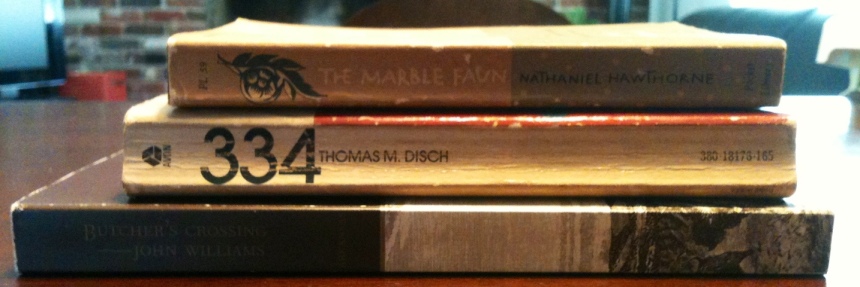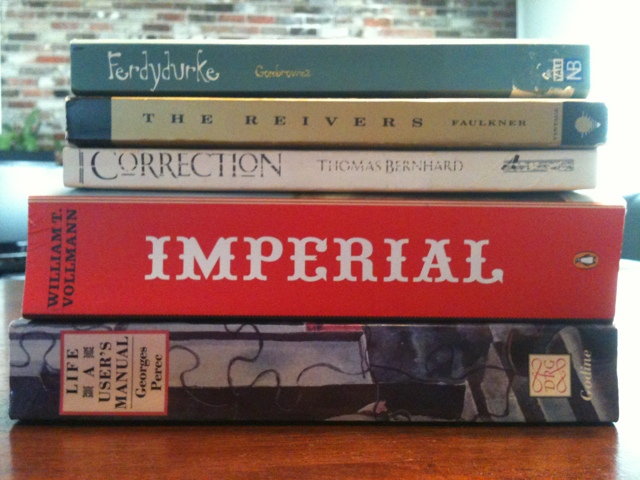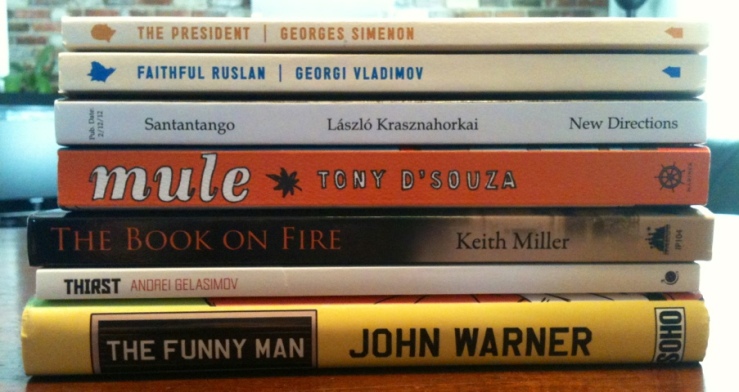Okay. So obviously a list of the books I didn’t read in 2011 would be, y’know, long.
This post is about the books I set out to read, tried to read, wanted to read, abandoned, neglected, acquired and thought looked interesting, etc. It’s also about what I want to—what I plan to—read in 2012.

A reasonable starting place: I wrote a post in early January of this year detailing the books I would try to read in 2011. I actually read most of the books I named in that post. But:
I failed to read past page 366 of Adam Levin’s incredibly long novel The Instructions, although I think I was a bit too harsh in my semi-review. Chalk it up to exhaustion.
I failed to even begin to try to read William Gaddis’s incredibly long novel JR. (But I swear to read it one year. Not next year, but maybe the year after?).
I failed to read past the first chapter of Katherine Dunn’s Geek Love.
I read most of the Tintin collections I picked up last year, but I didn’t get to volumes 5 or 6.

Moving beyond that early post, books that I recall abandoning (although I’m sure there must be more):
I abandoned Nathaniel Hawthorne’s Italian romance The Marble Faun after about 30 pages.
I abandoned 334 by Thomas Disch after about 50 pages. Somehow simultaneously dense and loose, it struck me as intensely imagined and sloppily composed.
I abandoned John Williams’s Butcher’s Crossing after the first chapter; it was a great opening chapter, but I thought it was going to be, I don’t know, more like Blood Meridian.
I also abandoned Chad Harbach’s big book The Art of Fielding (after 100 pages) because it was lame (notice it’s not pictured above because I traded in that sucker), but I had a nice dialog with some readers who responded to a post I wrote about abandoning it, so that was a plus.

Books I bought in 2011 that I aim to read in 2012:
Correction by Thomas Bernhard. Bernhard was a repeated suggestion from readers in the aforementioned Harbach post/rant, and he was apparently a huge influence on W.G. Sebald, so, yes, looking forward to this.
The Reivers by William Faulkner. I read A Light in August this year and reread most of Go Down, Moses. My plan is to read one Faulkner a year for the next ten years.
Ferdydurke by Witold Gambrowicz. I struggled to make it through Gombrowicz’s bizarre jaunt Trans-Atlantyk, but once the novel taught me how to read it, I was enchanted by its strange humor and frenetic syntax. Over some beer and wine, I had a conversation about Ferdydurke with my father-in-law’s priest who is Polish. His pronunciation of Ferdydurke should win an award for charm.
I will read Georges Perec’s big book Life: A User’s Manual.
I have already promised to read William Vollmann’s Imperial.
There are many, many more, of course (too many, really).

Books people sent me to read and review that look really cool that I will be reading and reviewing at some point in the very near future:
Satantango by László Krasznahorkai: I will read this and review this in the very near future.
The Funny Man by John Warner: Comedy, drugs, celebrity culture.
The Book on Fire by Keith Miller: This one is about a biblioklept. It’s been at the top of my stack for a few months now, but I keep letting myself get distracted.
Thirst by Andrei Gelasimov: Apparently this novella about a maimed alcoholic war vet is funny. (I hate the cover).
Mule by Tony D’Souza: Middle class man sells marijuana cross country. (I love the cover).
Various titles from Melville House’s Neversink line: I’ve got a few in the stack.
Also: I got a Kindle Fire for Christmas. I actually stayed up really late last night reading free public domain books from Hawthorne, Melville, Whitman, and Dickinson; I’ll read a contemporary novel on it this year—Neal Stephenson’s Snow Crash, perhaps? Suggestions welcome!—and try to review both novel and the process of reading the novel on a warm glowing machine.
And: I’m sure there are a ton of novels that will come out in 2012 that I’ll want to read; I’m already primed for Dogma, Lars Iyer’s sequel to Spurious.
So: What are you guys looking forward to reading in 2012? What did you fail to read in 2011?

Started a book yesterday called Whistling In The Dark by Lesley Kegan and haven’t been able to get past page 42. I think it’s just moving too slow for me. Anyway, planning to read Three Short Novels by Dostoyevsky today. I read Crime and Punishment about 2 years ago and absolutely loved it! Happy reading! :)
LikeLike
I read C&P in high school and it was a slog; I think I’d get waaaaaay more out of it today. I re-read Notes from Underground a few years ago and loved it.
LikeLike
Been on a Leonard Michaels kick lately. Just got done reading I WOULD HAVE SAVED THEM IF I COULD. Also started reading Kate Zambreno’s GREEN GIRL, which I like so far. The best work of fiction I read this year was THE PALE KING, and it’s not even close, what people don’t realize is that DFW, as a writer, was about to hit his prime, and THE PALE KING is composed of so much good writing, fantastic writing, that I’m baffled by all the people who just kind of dismiss it as scraps of rantings and ravings that make up one man’s suicide note, which it’s not, not even close, it’s a very important piece of fiction, and hopefully, in the near future, 15 to 20 years from now, people will be able to read it with a cleaner eye and mind. I’m looking forward to reading Geoff Dyer’s ZONA, about Tarkovsky’s STALKER, I read the first chapter in the Paris Review and it hooked me. I’m also looking forward to reading THIS IS NOT A TRAGEDY, about the works of David Markson. I would like to get my hands on a copy of Eduoard Leve’s AUTOPORTRAITE. I think I might like it better than SUICIDE.
LikeLike
I read the Dyer excerpt in the PR too, and dug it.
I loved The Pale King, but it seems like Wallace’s immediate legacy will be his essays, which are also great too, of course.
LikeLike
I’m jealous of those Neversink titles. I just read Georges Simenon’s THE TRAIN, which is part of that series. I’m looking forward to your review of THE PRESIDENT because I really loved THE TRAIN.
I’ve also got a copy of THE INSTRUCTIONS sitting around waiting to be read. It’s an attractive shelf item (along with my unread copy of Sayles A MOMENT IN THE SUN)
LikeLike
Yeah, I’m not sure which Neversink to go with next. I guess The Train then.
LikeLike
Geoff Dyer’s Zona is the book I am awaiting most eagerly, but I also plan to read Peter Nadas Parallel Stories despite the lukewarm critical reception. Also on the radar is Lydia Davis’s The End of the Story, and I have plans to tackle some of László Krasznahorkai and Enrique Vila-Matas.
This year I abandoned Infinite Jest part way through, and may try Pale King in 2012. I’ve also decided that I no longer enjoy Umberto Eco’s fiction so gave up the attempt to read is latest.
LikeLike
Anthony,
What made you decide that about Eco’s fiction? I have really loved what I’ve read (Mysterious Flame of…, Name of the Rose, and Foucault’s Pendulum) but haven’t been inspired to go elsewhere and the new one has been tempting.
LikeLike
P.T.Smith,
It is a highly personal reaction, and a difficult one as I long considered Eco one of my touchstone writers, but over the last few years I’ve been reading some better writers and Eco’s flaws became more evident (to me). I started the The Prague Cemetry and think it is a mess: an over-written (under-edited) monologue with weak characterisation; once I started down this track I partially reread some older Ecos and, with the exception of Name of the Rose, found them wanting. I’ve allowed sentiment to stand in the way of an honest appraisal of Eco’s work.
LikeLike
I listened to an audiobook version of Baudolino this year. I liked it—very funny and smart—but at a certain point it just unravels. I dig its picaresque structure—it seems to be modeled in part on Candide—but it’s too long and all over the place. Foucault’s Pendulum is exactly the sort of smart detective novel that should be airport reading in a better world; instead we got The Da Vinci Code.
LikeLike
Back in the day when Borders existed, I once saw one of those special stands they sometimes put together to support one book, I think it was the newest book by Dan Brown, so it was covered in his books and the same ilk…except also Foucault’s Pendulum.
LikeLike
I have a huge pile like you. Sheesh, it’s daunting. Hope you get through your TBR Pile in 2012!
LikeLike
Leaving aside the books given up for good, these are the books left half read and with a mind to get into them again next year.
1. Petals of Blood -Ngugi wa Thiong’o
2. Freedom – Jonathan Franzen
3. Terra Nostra – Carlos Fuentes
4. Thug – Mike Dash
5. Blood Meridian – Cormac Mccarthy
Other than ‘Freedom’ the other books were left hanging mainly due to my mindset at that particular point. Freedom, didn’t like it
as much as the others, but will get back to it.
Looking back at the books I have enjoyed this year, I have tended towards either straight forward realism (Richard Russo, Deborah Eisenberg) or outwardly playful narratives that can be profound and mind bending (Infinite Jest, Dictionary of Khazars). Maybe that’s why
I have left these half read.
LikeLike
I wasn’t a big fan of Freedom. Blood Meridian is one of my favorite books.
LikeLike
it struck me as intensely imagined and sloppily composed.
It is in no way sloppily composed; its structure is actually very sophisticated. Whether for you the effort of piecing it all together if the various parts don’t hold your interest is worth the while may be another matter. I’d be curious to read your response to Life: A User’s Manual, which has a very similar premise – a myriad of microvignettes and set pieces that reveal themselves part of larger sequences. While Life’s A User’s Manual is easier to read, ultimately piecing together the puzzle is less satisfying, precisely because for all the playful temporal and spatial dislocation it lacks the tonal constrasts that complicate and add a further dimension to the stories of 334.
LikeLike
Hey, Marco. My comment that 334 is “sloppily composed” refers to the sentences and paragraphs I read; I didn’t get deep enough into the book to see how the sections play off of each other.
LikeLike
A suggestion? Ditch the Kindle it doesn’t smell of decaying paper and has all the charm of Pringles – those potato chips of uniform shape composed of reconstituted potato dust.
Snow Crash is great but a mere thought when compared to Stephenson’s later work.
LikeLike
I like the Kindle, but I’ve also been known to eat Pringles.
LikeLike
I like Disch’s writing, but even without, the stories in 334 make it worthwhile. Try skipping to Angouleme and just reading that one and see if it captures your imagination better. As for Butcher’s Crossing, it takes a while to get going, but it is nearly the equal of Stoner and perhaps better than Augustus: I reviewed it here.
Incidentally, Disch said he did not know of the Oulipo in the least when he wrote 334.
LikeLike
Hi, David—thanks so much for the link—great review, btw. It makes me want to pick up the book again. I have Augustus around here somewhere—I’ve had it for years; I bought it back in college, probably 12 or 15 years ago. I bought it for its subject matter (I was not aware of Williams as a writer). I’ve been meaning to read Stoner as well, but haven’t come across it used.
I should probably give 334 another shot. I get distracted easily though, especially when new books are coming into the house all the time.
LikeLike
Ah, in that case definitely read Stoner first! I probably would have given up on Butcher’s Crossing because of the subject matter had I not been more than won over by Stoner.
LikeLike
Since you reference an audiobook in the comments, I’ll mention that there is a great audio version of J R narrated by Nick Sullivan. It made the book much easier to follow since from his voice you could immediately tell which characters were speaking.
I’ve read (and commented on) Williams’ books in the past 18 months or so. I had the same problem with Augustus–I just couldn’t get into it at first because of my expectation (for me it was in comparison to his other books). Once I did overcome that, though, it was extremely enjoyable. Good luck!
LikeLike
Dwight, thanks for the recommendation on the audiobook of JR — I downloaded it from Audible last night and will begin it after I finish the audiobook I’m on right now.
LikeLike
I slogged through the Instructions earlier this year, and what made the entire experience worth it is the “letter” from Philip Roth, relayed in a a note, to the protagonist that at once worked within the plot and could have easily have been a note written by Roth to the author himself. Simply delightful. Did feel like I waited for a huge payoff at the end and wasn’t sure I got what I wanted (at least in to the degree), but I don’t regret lugging the 1000+ page hardback around for a while. Certainly put teaching middle school into perspective.
An addendum: I picked up the Avian Gospels on your recommendation and was delighted to find the dedication to volume one for Adam Levin.
Another: I purchased Witz by Josh Cohen after reading his review of the Instructions in the NYT Book Review and still haven’t cracked it. His review, I think, was the straw that broke the camel’s back on my getting the Instructions in the first place. I can’t imagine how many people have made the same choice.
LikeLike
I hope you like The Avian Gospels as much as I did.
LikeLike
Still waiting to come to pass judgment, but the tone was not what I expected, even from the prologue.
LikeLike
[…] Architecture of the Arkansas Ozarks rightfully should have shown up on my Books I Didn’t Read in 2011 post, but it was doubly neglected, left under a pile of half-read books that I intend to keep […]
LikeLike
[…] Not very exciting, I know! This is perhaps the only photo in this book shelf series that will not feature shots of spines. Like I said, I don’t plan to arrange any of the shots in this series. I talked about a lot of what’s in here in yesterday’s riff on recent reading and a post last week on stuff I plan to read in 2012. […]
LikeLike
I always have this problem : ) right now, there are about three piles in my room of books I’ve acquired and haven’t gotten around to… Am reading War & Peace at the moment and enjoying it thoroughly! A book I’ve always wanted to read and am so happy to finally get around to : )
LikeLike